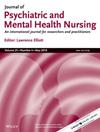Using Delphi method to address factors contributing to aggressive behaviour in mental health settings
Abstract
What Is Known about the Subject?
- Nurses' perspectives and consensus on the possible key factors contributing to aggression at inpatient units can be summarized into patients' related factors, staff related factors and environment related factors.
- Results of the possible factors contributing to aggression at inpatient units reflect the complicated nature of this problem.
What the Paper Adds to Existing Knowledge
- Perspectives of nurses as frontline mental health professionals on factors contributing to aggression as one of the psychiatric emergencies were considered through an iterative process. This approach gave nurses an opportunity to revisit their own views in each round to provide an in-depth reflection in the light of the contribution of others.
What Are the Implications for Mental Health Nursing Practice?
- Nursing curricula should focus on nurses' communication skills and emotion regulation training.
- An open dialogue between nurses and people with mental health issues should be initiated to discuss the possible key factors contributing to aggressive behaviour at inpatient units from both standpoints.
- Mental health nurses' turnover at inpatient settings could be targeted through the design and implementation of aggression prevention protocols
4.1 Introduction
Aggression at inpatient units is a universal problem leading to hazardous outcomes.
4.2 Aim
To generate group consensus about factors contributing to aggressive behaviour among patients with mental health issues at inpatient units.
4.3 Methods
Nurses working at inpatient psychiatric departments were approached, and purposive sampling was employed to implement Delphi technique. A total of three Delphi rounds were conducted online. The average percent of majority opinions method was followed to measure consensus in which questions with a cut-off rate below 69.7% were included in the next round.
4.4 Results
Twenty-one nurse experts with different skills participated in this study. Consensus increased among nurse experts across rounds for the following items: Patients' misinterpretation of the attitude of the healthcare providers, severity of mental health issues, attitude and communication style of the healthcare providers, nurses limited emotional regulation capacity and the inadequate staff–patient ratio in psychiatric wards.
4.5 Discussion
The complicated nature of aggressive behaviour displayed by people with mental health issues is reflected on the results of the current study; patients' related factors, staff related factors and environment related factors constitute interacting facets for this issue.
4.6 Implications for Mental Health Nurses
Nurse scientists could use insights derived from this study to design studies aiming at assessment and management of aggression at inpatient units guided by implementation science frameworks. Additionally, open dialogues between nurses and people with mental health issues could be initiated about factors contributing to aggression at inpatient units. Mental health nursing training should focus on nurses' communication and emotion regulation skills.

 求助内容:
求助内容: 应助结果提醒方式:
应助结果提醒方式:


